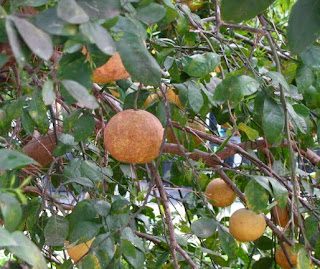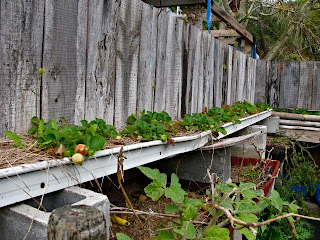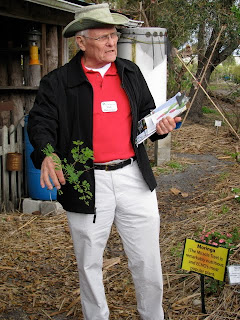 Yesterday morning we took a field trip to the campus of ECHO farm, in North Ft. Myers. Doug and Matt have been there before and we wanted to go in November, but tours are given only at certain times, and we missed out. Saturday was gray, and the sky was threatening rain when we arrived.
Yesterday morning we took a field trip to the campus of ECHO farm, in North Ft. Myers. Doug and Matt have been there before and we wanted to go in November, but tours are given only at certain times, and we missed out. Saturday was gray, and the sky was threatening rain when we arrived.
ECHO stands for Educational Concerns for Hunger Organization. The staff provides solutions to agricultural problems in some 180 countries. They provide information, seeds and training.

There are 7 demonstration gardens on the site, as well as a nursery where local people can buy and try out tropical food plants for themselves, including the papaya. A recent freeze had killed much of the foliage, but often the fruit was still viable, as it was on this plant.

This is the original ECHO house on the grounds. The farm started with a small plot and now more acres have been added, and new buildings house the offices, staff and interns, but this is still in use.
 Our tour group set out with our guide, Bob, to see the various areas in the Global Village. One plant grown extensively is bamboo. Unfazed by the freeze, the stands of bamboo towered overhead.
Our tour group set out with our guide, Bob, to see the various areas in the Global Village. One plant grown extensively is bamboo. Unfazed by the freeze, the stands of bamboo towered overhead.
Sustainable farming for various parts of the tropical world is demon- strated at ECHO. Terraces can create level growing space on a mountain, and stop erosion. Rocks from the area can stabilize the terrace. And a simple device consisting of an a-frame and a rock suspended from a rope makes a perfect level.
 Part of ECHO's mission is training. Each year a group of interns spends a year in residence. Each intern is responsible for a plot in one of the growing areas. These vegetables in raised beds are in a simulated semi-arid area. They are watered by drip irrigation from a nearby well.
Part of ECHO's mission is training. Each year a group of interns spends a year in residence. Each intern is responsible for a plot in one of the growing areas. These vegetables in raised beds are in a simulated semi-arid area. They are watered by drip irrigation from a nearby well. The well in this area is quite a piece of engineering. The pump is hand- or foot- powered. Water is raised to the tanks, then flows through hoses to water the various crops. Many other simple irrigation devices that can be built with recycled materials on site by the people served were shown throughout the villages.
The well in this area is quite a piece of engineering. The pump is hand- or foot- powered. Water is raised to the tanks, then flows through hoses to water the various crops. Many other simple irrigation devices that can be built with recycled materials on site by the people served were shown throughout the villages.
This duck was one of a group that had a cage above a pond. The droppings from the ducks enriched the pond, which also was stocked with fish. Water from the pond could be siphoned off to use to fertilize certain crops. One part of the ECHO philosophy includes using animal byproducts to create free fertilizer.
 These chickens, called Turkens, are moved from food plot to food plot to scratch, eat insects, and provide fertilizer. This one is part of a group feeding in a field of sugar cane. The cane was frozen in the recent cold spell, but it will be felled by volunteers and composed, and the chickens moved to another fenced area.
These chickens, called Turkens, are moved from food plot to food plot to scratch, eat insects, and provide fertilizer. This one is part of a group feeding in a field of sugar cane. The cane was frozen in the recent cold spell, but it will be felled by volunteers and composed, and the chickens moved to another fenced area. Rabbits of many varieties are housed and fed in raised cages. Their manure is collected and composted. We also saw a raised crib for goats, but I didn't get a good picture.
Rabbits of many varieties are housed and fed in raised cages. Their manure is collected and composted. We also saw a raised crib for goats, but I didn't get a good picture.
Many tropicals, such as bananas and coffee, were blasted by the recent, unexpected cold. One green leaf on this plant shows its determination. New plants will arise from the roots and bear a crop in one year, so the damage is not permanent.
 Among the most luxuriant crops at ECHO were the citrus trees. These were small oranges or tangerines, and seemed quite healthy.
Among the most luxuriant crops at ECHO were the citrus trees. These were small oranges or tangerines, and seemed quite healthy. This ruby red grapefruit looks a little more rugged than one found in a northern super- market, but it probably will be sweeter to the taste. Various fruits are for sale in season at the farm store.
This ruby red grapefruit looks a little more rugged than one found in a northern super- market, but it probably will be sweeter to the taste. Various fruits are for sale in season at the farm store. These looked so good. I didn't write down the name but it was some kind of tangerine- citrus cross. It was enough to make a person hungry.
These looked so good. I didn't write down the name but it was some kind of tangerine- citrus cross. It was enough to make a person hungry.
And here are key limes on the tree. All of the lime varieties had fruit on the trees, but they also were coming into bloom. Key lime pie would be good right about now.

Because many people in the topical zones live in cities that are pretty much concrete jungles, ECHO also does research on urban rooftop gardening. Various methods include planting in shallow containers with compost on the bottom and a thin layer of soil on top, covered with mulch. Another technique is wick gardening, that uses old socks or other cloth to draw water for plants out of discarded containers, such as soda cans.
 One container that caught Norm's eye was this gutter garden that was growing straw- berries. The container was two lengths of guttering laid side by side. Water escapes through small drain holes. A good use for battered gutters that have been replaced by new, at least in our country.
One container that caught Norm's eye was this gutter garden that was growing straw- berries. The container was two lengths of guttering laid side by side. Water escapes through small drain holes. A good use for battered gutters that have been replaced by new, at least in our country. We were a little surprised but also impressed to see plump berries growing in less than 3 inches of soil. This kind of gardening is intensive, but adaptable for folks who have no other way to grow fresh foods.
We were a little surprised but also impressed to see plump berries growing in less than 3 inches of soil. This kind of gardening is intensive, but adaptable for folks who have no other way to grow fresh foods.
Our guide paused at a display of Moringa trees and clipped off a branch so our group could sample the leaves, which were minty and citrusy. ECHO promotes the culture of this plant that has edible leaves, flowers, pods and green seeds. The leaves are said to be high in calcium, vitamin C and vitamin A, as well as protein and potassium. The leaves are dried and powdered and used as a nutritional supplement; the powdered seeds are used to purify dirty water.
ECHO works through missionaries and Peace Corps workers, mailing seeds to them that they can experiment with in the countries where they work. The second year they pass on the saved seeds to local farmers. Farmers attend training session on how to make the most of the seeds, and also how to grow them effectively, using some of the techniques that have been pioneered at ECHO. The organization is non-profit, interdenominational Christian in origin. Two teams have gone to Haiti to assess how they can provide farmers there with seeds and expertise in the aftermath of the earthquake. ECHO has worked with partners in Haiti, and other parts of the world, for decades.We look forward to another visit in a different season to see other crops in season.









No comments:
Post a Comment